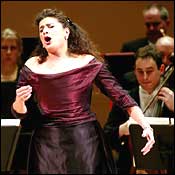
The Metropolitan Opera press room looked very lonely one Saturday evening not long ago. After all, it was the fifth performance this season of Tchaikovsky’s The Queen of Spades with Plácido Domingo, and most critics had already weighed in on opening night. But I wanted to wait so as to see the Met debut of Adrianne Pieczonka, a Canadian soprano whose European career is taking off. Her home base since 1991 has been the Vienna State Opera, and she has sung the Verdi-Mozart-Strauss repertory all over the Continent during the past decade—from Glyndebourne to Salzburg—to impressive reviews: “effortless silvery tone,” “shining lyric voice,” “a lovely presence,” “exquisite musicality.”
That was enough to pique my curiosity, and I was glad it did. As the hapless Lisa, Pieczonka is everything they say she is. She makes this appealingly fragile character all the more heartbreaking by emphasizing her impulsive nature, at first an ecstatic love-drunk girl ready for anything and later a desperately doomed woman who loses it all, including her life. This she does with a voice that gains additional expression and color as the portrait deepens, a smoothly textured, fully integrated lyric soprano of ample size and flexibility. Not so long ago, a singer of Pieczonka’s quality would have been snapped up by an important record company, showcased in recitals and complete operas, heavily promoted, and ready to make a Met debut that would have had everyone (instead of a few insiders) eager to hear her. Those were the days.
In all other respects, the Met’s Queen of Spades production retains its distinctive visual qualities in the canny mix of czarist realism and supernatural spookiness that characterizes Elijah Moshinsky’s stage direction and Mark Thompson’s brooding sets, cunningly lit by Paul Pyant. For whatever reason, Domingo seems more actively involved than he often does these days, and if he has few vocal thrills left to deliver, his tenor remains astonishingly resilient. For Slavic authenticity and vocal plangency, Nikolai Putilin and Vladimir Chernov would be hard to beat, while Felicity Palmer is properly chilling as the ancient Countess. The orchestra, I’m sorry to say, sounds rather lackluster under Vladimir Jurowski’s baton, more content to provide efficient accompaniments than orchestral drama.
A few days after Pieczonka’s Met debut, a more celebrated singer came to town—Cecilia Bartoli—and not surprisingly, Carnegie Hall was packed for the event. Bartoli, of course, achieved global fame a decade ago in large part owing to promotional efforts by the classical-recording industry. Decca Records was then a powerful British company that had tirelessly nurtured the careers of many famous singers of the past 50 years, from Tebaldi to Pavarotti, and Bartoli will surely be the last artist able to take advantage of that mutually beneficial relationship. In fact, the mezzo’s American tour, like any rock star’s, was designed to sell her latest record, this one devoted to the long-neglected operatic music of Mozart’s notorious rival and fabled murderer, Antonio Salieri.
Nothing wrong with that. The record is a stunner, offering a glimpse at a once-famous composer who has unfairly suffered a bad rap. Bartoli is even more effervescent singing this music in person, tossing off coloratura fireworks, exploring a variety of expressive nuances, and drawing on a fascinating set of body signals to communicate instrumental cues to the Orchestra of the Age of Enlightenment. Afterward, the singer retired to Carnegie’s Rose Museum to sign CDs and meet her adoring fans, blending art and commerce in ways that just don’t happen anymore.